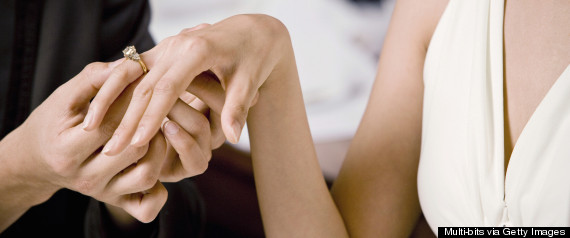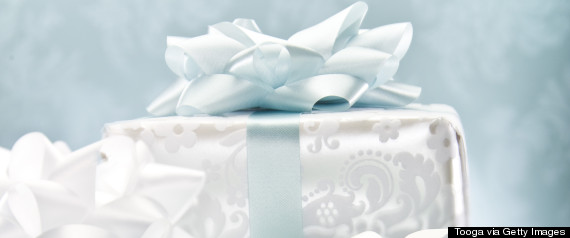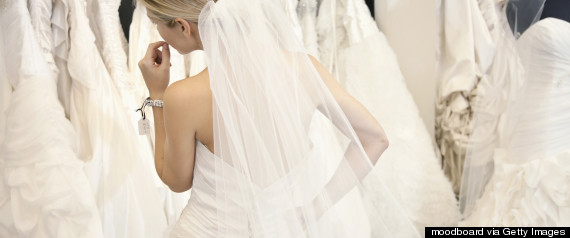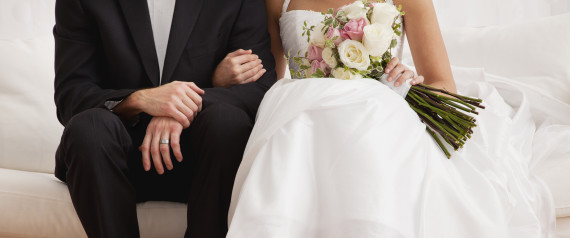5 Things You Only Believe About Weddings Because Advertisers Told You To
While some wedding traditions are lovely and make for lasting memories, others feel forced, dated and altogether irrelevant.
Interestingly enough, many of the expectations and traditions that we consider integral to getting married are actually the invention of savvy advertisers. Here are five you may not have known about:
1. Diamond engagement rings prove your love.

The engagement ring wasn't always mandatory -- and it wasn't always a diamond. Then, in 1938, the De Beers diamond company launched an aggressive marketing campaign to make the engagement ring a "psychological necessity" for any couple who wanted to get married. The De Beers campaign swayed popular opinion through events like organized lectures at high schools across the country promoting the importance of the diamond ring. And it worked: diamond sales rose 55 percent in the United States from 1938 to 1941. In 1947, they launched the slogan "Diamonds are forever," and by the '50s, De Beers advertisers were pleased to note that young people were delaying their marriages until they could afford a ring.
2. So you'd better spend two months salary on it.

De Beers was also responsible for the conventional wisdom that a man ought to spend two-months' worth of salary on an engagement ring. Their successful ads in the late '40s used catchphrases like, "You can't look at Jane without telling me she's worth two months' salary. Just look at her". De Beers even set various standards around the world; in Japan, three months' salary was advertised. They also promoted the "surprise engagement" after their marketing research determined that men chose more expensive engagement rings when they went shopping without their wives.
3. A guest must buy the couple a nice gift, selected from a wedding registry

You may think that giving the new couple a place setting or knife set is the height of politeness, but for most of human history, wedding guests weren't socially expected to bring gifts unless they were family or intimate friends. Gifts were typically humble house necessities, like linens. Then, in 1924, Marshall Field's, now Macy's, created the first wedding registry and many retailers followed suit to encourage guests to purchase luxury goods, like fine china and silver for the new couple. Today, about 96 percent of couples register for gifts.
4. Your dress should be ornate, enormous, white, and you must only wear it once in your life.

Queen Victoria first made the enormous white wedding dress a thing in 1830, but for a long time, only the very wealthy wore the style. Up until the 1930s, women would often get married in dresses they already owned or buy new, reusable dresses in darker colors that wouldn't stain. The white, full-skirted "once-in-a-lifetime" wedding dress likely originated with department store bridal salons in the late '20s, who saw the money-making potential of marketing expensive dresses that women would never wear again.
Before then, wedding dresses had typically followed fashion hemlines of the moment, but the bridal industry attempted to "maximize profits by promoting more expensive floor-length gowns." That ideal wedding dress was promoted throughout wedding magazines and advertisements. In the '60s, the Bridal Apparel Association even commissioned studies that attempted to prove that a white wedding dress made for a more stable marriage.
Before then, wedding dresses had typically followed fashion hemlines of the moment, but the bridal industry attempted to "maximize profits by promoting more expensive floor-length gowns." That ideal wedding dress was promoted throughout wedding magazines and advertisements. In the '60s, the Bridal Apparel Association even commissioned studies that attempted to prove that a white wedding dress made for a more stable marriage.
5. If you spend enough, you can buy your "perfect wedding."

If having the perfect wedding seems impossible to achieve, that's because it's an imaginary standard. As Cele Otnes and Elizabeth Pleck wrote in "Cinderella Dreams,""The idea of the perfect wedding is not age-old, but instead was created by the bridal industry and eventually accepted by the public," and likely was first popularized in the 1920s. In the years that followed, they note, "the word appears in the founding statement of every bridal magazine or bridal association..." and was used to advertise everything from wedding menus to bachelorette parties. While weddings had previously been homemade, often humble affairs for most Americans, the quest for "perfection" necessitated tons of spending.
7 comments
Oh true!
ReplyDeleteWelcome to my blog♥
Koka Blog
Uma bela matéria, em um casamento tudo é importante e fica a lembrança para uma vida toda. Amei seu blog.
ReplyDeleteTenha uma ótima semana.
♥
ReplyDeleteWeddings are a personal thing and the only ones who should dictate it should be the ones getting married.
ReplyDeletehaha, so true, i read somewhere that people goes well mad for wedding getting massive loand and then spend even more for divorces, lol :)
ReplyDeleteThis is a great post. Thanks for visiting my blog. My sister's just getting married and I see everything you're writing happening live.
ReplyDeleteAll the best with your blog. Awesome concept.
I'm your new follower :)
Love from Ghana.
http://zoharous.blogspot.com
Absolutely great post and I love your blog!
ReplyDeletewww.Deluxefashionista.com